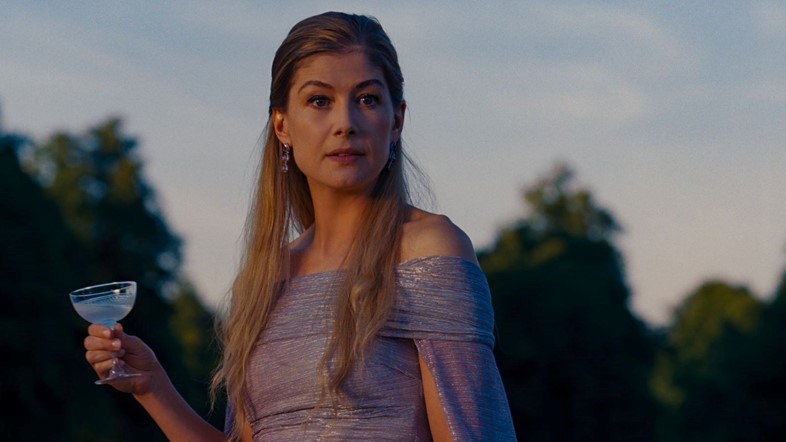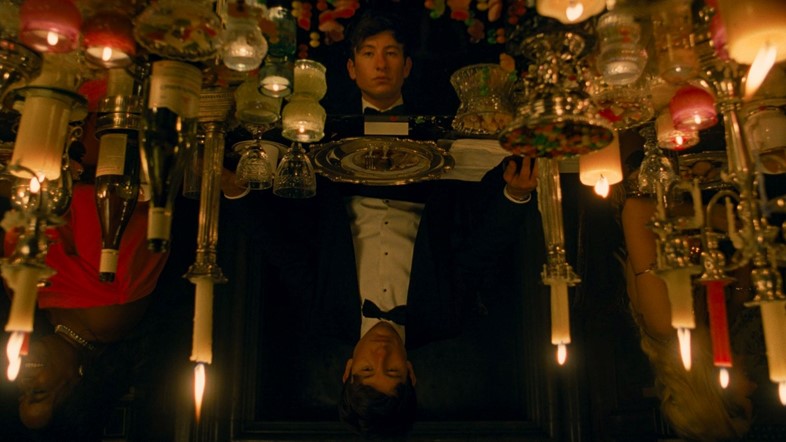As her twisty, erotic thriller about the unfairness of wealth and class comes out, Emerald Fennell talks about “awfully rich people behaving awfully”
“There’s nothing more absurd than being human,” remarks Emerald Fennell, the writer-director behind Promising Young Woman. “We’re all trying to be dignified in impossibly undignified bodies. Our thoughts and desires aren’t dignified. The only certainty is that we’re going to die, and we spend every day refusing to acknowledge that, because that’s the only way of surviving.”
Fennell isn’t in the middle of a therapy session but describing the motivations behind her second feature, Saltburn, a twisty, erotic thriller about the unfairness of wealth and class. “Absurdity is a part of life,” she continues. “Therefore, any social construct we have – class being the foremost in our country – is completely absurd. And, in general, I’m always going to be interested in sex and power at the centre of everything. Those are the central tensions of all drama. Whether it’s the dynamics between men and women, or between the class system – that’s going to be fascinating forever.”
Saltburn, though, centres on two young men: at Oxford University in 2006, Oliver (Barry Keoghan) is a shy, bumbling student who barely hides his crush on Felix (Jacob Elordi); after pretending his father died, Oliver snags an invite to Felix’s countryside mansion over summer. Cue a tale of obsession: Oliver spies on Felix masturbating in a bathtub, and later sneaks in to slurp the water. “I wanted to write about love, and what it feels like when it’s so vast that it will eat everything,” says Fennell. “But, also, the genre is about love. It’s about desire and restraint. I wanted to unrestrain it.”
Since Telluride, Saltburn has been repeatedly likened to The Talented Mr Ripley, a reaction that blindsided Fennell. “I’m obsessed with Patricia Highsmith’s books. But Saltburn is a very British story of restraint. They’re not very similar.” I tell her that Variety and IndieWire reference The Talented Mr Ripley in their review headlines. “You’re so powerless,” she sighs. “Not you. I’m so powerless.” She names The Go-Between, Atonement, and Brideshead Revisited as more apt comparisons. “The British, gothic, country-house film is such an established genre. Saltburn needed to have the same story beats and visual language. Then it’s not quite so familiar, the further you go in.” Perhaps, then, Saltburn has more in common with Ripley from Alien? “I love that. This film is in dialogue with genre. It’s looking at the way we tell stories.”
Sat on a sofa in Ham Yard Hotel in early November, Fennell is upbeat, talkative, and cheerfully aware that her films are divisive. Instead of a hello, she enquires, “So, what did you think?” To some, Promising Young Woman is a daring, razor-sharp rape-revenge thriller that skewers supposed “nice guys”; to others, it’s the pinnacle of white feminism, complete with an ending that suggests the police can rescue the day. Saltburn, too, has proven contentious amongst critics, partly because it toys with certain tropes and then veers in wildly disparate directions – an intentional subversion, Fennell insists.

Regardless, what most people can agree on is the magnetism of Keoghan and Elordi, the latter exuding the woozy, unsettling warmth he displays as Elvis in Priscilla. Filling up the ensemble is Felix’s upper-class parents (Rosamund Pike and Richard E Grant on top form) and various posh-accented friends and relatives whose caustic one-liners are designed to cause revulsion. Fennell’s screenplay, then, lives in the “awfully rich people behaving awfully” world that saw Succession and The White Lotus soar during a cost-of-living crisis. “It’s the same reason that James Bond was so popular after the war,” says Fennell. “When it first came out, people were still living with rationing. The books were about hotels, food, and clothes, as much as the sex and plot.”
Fennell, though, is an Oxford graduate who famously comes from a privileged background. Her 18th birthday party was covered in Tatler magazine; as an actor, she convincingly depicted Princess Merkalova in Anna Karenina and Camilla Parker Bowles in The Crown. Moreover, a source of controversy arose when she took over as the showrunner of Killing Eve season two – Phoebe Waller-Bridge, an executive producer, acknowledged that the pair were friends. To this day, Promising Young Woman is still debated on social media. As a reminder: after Carey Mulligan’s character Cassie is murdered, it’s momentously revealed that she scheduled text messages with damning video footage to her killer’s friends and the police.
When I bring up the backlash to her debut feature, Fennell claims she only learned about it recently. “It’s so fascinating to me, because the police are treated with nothing but disdain in Promising Young Woman,” she says. “What we see of the policeman is that he doesn’t care about the girl who’s disappeared, and when he visits the boyfriend [Ryan], the most obvious suspect, the direction I gave Bo Burnham was: ‘Be as suspicious as you possibly can.’ It’s an exercise in watching a policeman who’s made up his mind about who the girl is, and all he sees in front of him is a really decent doctor – an upstanding gentleman – and just gives him an alibi. He puts the words into his mouth. In the end, Ryan believes that he’s completely innocent, and that she was asking for it.

“The extent she has to go to, to get the policeman to notice … And, also, frankly, it doesn’t end with a court case. I’ve no doubt he’ll have found some way of slithering out of it. It’s about the systemic injustice, the impossibility of being listened to. The police are deliberately presented as blundering, sexist, and idiotic. The fact that they manage, at the end, to pathetically do one thing after it’s served to them on a plate, does not endear them to anyone. But, also, look, people can feel the way they feel. I don’t read it – because, well, it’s too late.”
As for Fennell’s next projects, she describes the importance of writing on spec. Unproduced scripts include the sci-fi sitcom Spacebound (“a fish-out-of-water alien romcom like Splash”) and Sweetness (“an anthology series about sadists”). “The way I like to write is, I want to be honest about myself, and what I think is sexy and difficult and complicated and that I find troubling. I wish I could do the new Transformers movie or something, but I can’t.”
I bring up Zatanna, the still unmade superhero movie she wrote for DC Comics. Was that also sexy and difficult? “I hope so,” she says. “It was when JJ Abrams was starting the Dark Universe again at Warner Bros. I was never going to direct it. It was a script they asked me to do. I was interested in the superhero movie as a genre. If you like genres, this is the genre of our time … It was demented and unbelievably fucking violent.”

Fennell adds, “What I really want to do is ask people uncomfortable questions. How do you nicely get people to impale themselves?” She smiles. “That’s what you’re trying to do.” Like me bringing up the Promising Young Woman backlash? “Yes. How do I get someone to slide down their own sword? That’s what I’m trying to do, too.”
Saltburn is out in UK cinemas on November 17.
